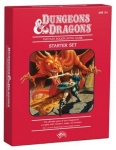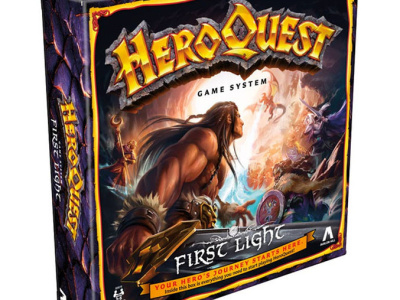 Rolling for Initiative is a new weekly column by Scott Thorne, PhD, owner of Castle Perilous Games & Books in Carbondale, Illinois. This week Thorne looks at how boxed set RPG products are once again making an impact on the market.
Rolling for Initiative is a new weekly column by Scott Thorne, PhD, owner of Castle Perilous Games & Books in Carbondale, Illinois. This week Thorne looks at how boxed set RPG products are once again making an impact on the market.Slowly but surely, we are seeing the return of a form of RPG packaging quite common during the 1980s, less so during the 1990s, and extinct during most of the last decade. I refer, of course, to the boxed RPG set. At the dawn of RPGs, Dungeons & Dragons arrived in the now classic "white box" format, then most of the D&D rulebooks released in boxed sets, as well as many of TSRs larger supplements. Champions, Call of Cthulhu, Runequest, Tunnels and Trolls, all had their starter sets released originally as boxed sets. Then the model went defunct right around the turn of the century and for most of the past 10 years, with rare exceptions (see Troll Lord Games), only boardgames and miniatures sets have come boxed. From talking with publishers, economics drove the decision to eliminate the boxed set. It costs much less to produce and bind a book than to fold a box and place the lithograph on the cover then go to the extra trouble of putting the books and accessories inside. It's much cheaper to bind or tip inside the rulebook the maps and paper or cardstock accessories that used to get sealed inside the boxed set.
In the last few years however, we have seen the slow return of the boxed set, first with the Wizards of the Coast's D&D 4th Edition Starter Set, the Dragon Age RPG Starter Set from Green Ronin, the new edition of Warhammer Fantasy Role Play and most recently, the Doctor Who RPG from Crucible 7. The main reason for this, as far as I can tell: the design of these games as starters. All contain a player’s book, a GMs book. and in the case of the Warhammer Fantasy RPG set, six and a half more pounds of material. Some contain maps of either the world or a dungeon, some contain dungeon tiles or counters, but there is one other item all 4 sets have in common: dice. These publishers have realized that, if you want to create a starter or introductory set for your RPG, it needs to let players play as soon as they open the box. For that, they need dice. Most RPG publishers operate under the assumption that they players have access to all the dice they because their games target the experienced role-player. They don’t address the players who have heard about Dungeons and Dragons or even, more generally, this "role-playing" thing, whose gaming experience only ranges to Monopoly and Aggravation or video games, who want to try out a tabletop RPG, and, for the majority of RPG genres, the store offers nothing to start them out on, save for Dragon Age, D&D Red Box, Doctor Who or Warhammer Fantasy Role Play.
No one just getting started, unless they are a huge fan of Doctor Who and plan to drop $60 for it or $100 for Warhammer FRP will consider those two. That leaves Dragon Age or the D&D Red Box, both fantasy RPGs, which is well and good but there’s no modern day or futuristic starter to point to a Halo or Call to Arms player, no superhero intro game to show the DC or Marvel fan, no martial arts or anime beginners set to appeal to fans of those genres. Even those RPGs that tout ease of play as one of their main advantages, such as Fairy Tale or QAGS, don’t have a starter set. The customer has to buy the book, then buy a set of dice, then wonder if they have bought the right set of dice. Of course, store personnel can help with this, and they should, but still, a low priced starter set eliminates one more reason for the customer not to buy.
I welcome the return of the boxed set, of the starter set and look forward to seeing more of them occupying store shelves over the next couple of years.
The opinions expressed in this column are solely those of the writer, and do not necessarily reflect the views of the editorial staff of ICv2.com.







